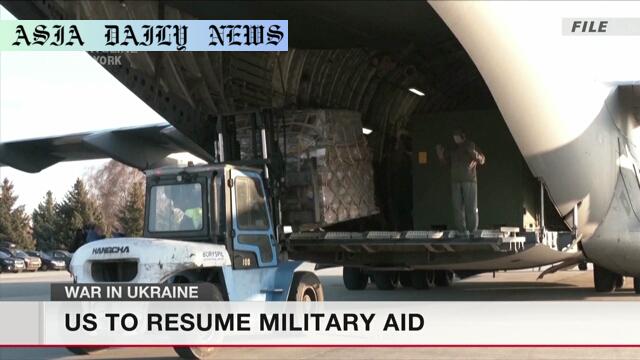Military Aid: US resumes arms shipments to Ukraine, citing defensive needs and growing aggression from Russia.

US Lifts Ban on Military Aid to Ukraine
The decision by the United States to resume military aid to Ukraine comes amidst heightened tensions between Ukraine and Russia. Last week, The White House announced a temporary hold on arms shipments to Ukraine, a decision that was met with strong reactions internationally. However, President Donald Trump has reversed the decision, emphasizing the pressing need for defensive weapons to support Ukraine in its ongoing conflict with Russia. In a cabinet meeting, Trump openly criticized Russian President Vladimir Putin, accusing him of human rights violations and engaging in aggressive military actions that have cost numerous lives.
President Trump’s statement signals a strategic shift in U.S. foreign policy amid the intensifying conflict in Eastern Europe. The resumption of arms shipments is intended to provide Ukraine with advanced defensive capabilities to withstand Russia’s ongoing military aggression, including the alleged use of drones, guided bombs, and missile strikes. This decision marks a significant step in strengthening the defensive alliance between the United States and Ukraine, signaling a renewed commitment to support Ukraine against authoritarian aggression.
Ukraine’s Strategic Response Under President Zelenskyy
In response to the U.S. decision to resume military aid, Ukrainian President Volodymyr Zelenskyy has prioritized ensuring a seamless delivery process of the arms shipments. On Tuesday, Zelenskyy announced plans to intensify diplomatic and military coordination with the United States, directing the Ukrainian defense minister and military leaders to bolster communication channels with their American counterparts. In a social media post, Zelenskyy highlighted the critical need to shore up Ukraine’s air defense systems, citing alarming numbers of Russian drone and missile attacks in recent days.
The Ukrainian government remains keen on fortifying its defensive capabilities amid fears of escalating conflict. In addition to bilateral talks on military support, U.S.-Ukraine diplomacy is also focusing on potential sanctions against Russia. This underscores Ukraine’s broader strategy to consolidate its security by leveraging international alliances while responding to the severe challenges posed by Russian military advances.
Russian Reaction and International Implications
Russia’s leadership has reacted cautiously to the United States’ decision to resume military aid for Ukraine. Kremlin spokesperson Dmitry Peskov expressed skepticism regarding the new arms shipments, suggesting that Russia needs time to analyze the exact nature of the weapons being provided. Criticism has also been directed at U.S. sanctions, which Moscow deems illegal and counterproductive.
This development further complicates an already fraught geopolitical climate. The resumption of U.S. military support for Ukraine comes at a time when diplomatic relations between Washington and Moscow remain strained. Additional talks in Rome and Kyiv aimed at reinforcing military cooperation between the U.S. and Ukraine are likely to impact regional stability and further polarize international dynamics regarding the crisis in Eastern Europe.
The Road Ahead in U.S.-Ukraine Relations
With U.S. special envoy Keith Kellogg set to hold discussions in Kyiv and Rome, it is evident that the situation will continue to evolve. As Ukraine gears up to receive vital military resources, Russia’s next move could significantly determine the trajectory of the conflict. This phase of U.S. involvement aligns with the Biden administration’s broader geopolitical strategy to counter authoritarian regimes globally while maintaining a robust commitment to its allies in Europe.
The resumption of military aid to Ukraine is not just a defense initiative; it is a reaffirmation of geopolitical partnerships and a declaration of the U.S.’ commitment to safeguarding democratic values against authoritarian threats. As the situation unfolds, the global community will closely monitor the high-stakes developments in the Russia-Ukraine conflict, with far-reaching implications for international security and diplomacy.
Commentary
The Importance of Supporting Ukraine
The United States’ decision to resume military aid to Ukraine is not only a strategic response to aggression but also an essential step in maintaining global stability. In today’s interconnected world, conflicts such as the ongoing one in Eastern Europe inevitably impact the broader international order. Supporting Ukraine’s efforts to defend its sovereignty sends a strong message to aggressors worldwide that territorial violations and human rights abuses will not go unchallenged.
President Trump’s criticism of Putin’s aggressive military strategies highlights the necessity of decisive action. While economic sanctions against Russia have been widely debated, providing material support to Ukraine underscores the U.S.’ commitment to its allies. For Ukraine, access to sophisticated defensive weaponry is crucial for mitigating the damage caused by the recent surge in drone and missile attacks. The situation is dire, and complacency at this juncture could embolden further aggression.
The Global Implications of this Decision
The decision to aid Ukraine also places the U.S. on a delicate path of balancing diplomacy and pressure. While supporting Ukraine is imperative, these actions may provoke counter-responses from Russia, potentially escalating tensions further. This underscores the need for robust diplomatic efforts to complement military support. Transparency regarding the types of aid being provided will also help address concerns from other countries, ensuring that defensive provisions are not misconstrued as provocations.
Ultimately, the U.S. military aid decision reflects more than just a bilateral concern; it is a symbol of leadership on the international stage. By standing with Ukraine, the United States reiterates its commitment to fostering global peace, security, and democracy. This decisive action will remain critical not only for Ukraine’s defense but also for affirming the values that underpin the international community.


